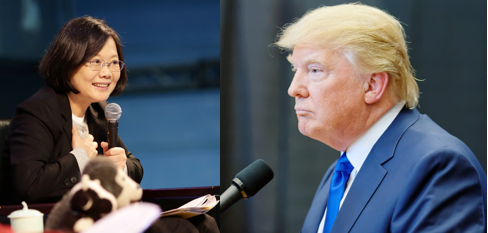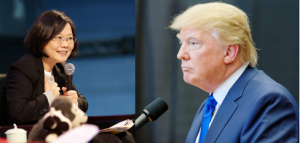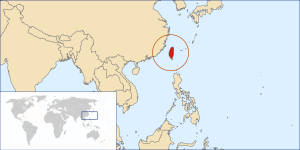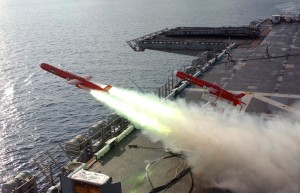The Phone Call that Shook the Sino-American Status Quo
 Taiwanese President Tsai Ing-wen (left), and American President-elect Donald Trump (right) spoke in a highly unprecedented phone call early on December 2, 2016.
Taiwanese President Tsai Ing-wen (left), and American President-elect Donald Trump (right) spoke in a highly unprecedented phone call early on December 2, 2016.
On December 2, 2016, one of the largest breaks from conventional U.S. foreign policy shook the world in the form of a phone call between President Tsai Ing-wen of Taiwan and President-elect Donald Trump. As has been previously reported, this simple phone call was a clear and public provocation of China on the part of the president-elect, a move that blatantly undermined the established ‘One-China’ policy which has defined decades of relatively stable Sino-American relations. Although he avoided taking full responsibility for the policy deviation and implied the source of the political affront originated from Taiwan by claiming “[it] was a call put in to me,” it has been deduced and reported that such a one-sided initiation was not the case. As Walter Lohman, director of the Heritage Foundation’s Asian Studies Centre argues, the call “was deliberate. It was not an accident. Obviously he made a conscious decision to have the call arranged. She called him, but there was an agreement for it.” Such a conclusion is further supported since, despite her democratic political leanings, President Tsai is not known for taking risky political leaps and since it would have been politically embarrassing had she called Trump in an unplanned phone call and been sent to voicemail.
The President of Taiwan CALLED ME today to wish me congratulations on winning the Presidency. Thank you!
— Donald J. Trump (@realDonaldTrump) December 3, 2016
Regardless of the circumstances, however, what is significant about the call is its implications. By taking the call, Trump has effectively placed Taiwan at the very centre of a growing Sino-American tension, designating it internationally as a bargaining chip and setting the stage for a political spar between these two great powers. What remains to be seen is how exactly the Taiwan question will influence the current state of international affairs as Mr. Trump takes office in January and as President Xi further consolidates power within China.

In analyzing his approach to China and Taiwan so far, Trump’s sensitivity to Cross-Strait relations may come as a surprise to some. In organizing the phone call with President Tsai, Trump seems to have tested the political waters in the Chinese-American relationship. By publicly announcing his call with Tsai on Twitter, Trump is effectively gauging the degree of Chinese sensitivity on the issue of Taiwan, probing into the inevitable reaction elicited by the Chinese and thus building a framework around which he can craft and define his policy toward China. For all of Mr. Trump’s supposed recklessness, it appears he is being quite careful regarding the Taiwan issue, never once going as far as to explicitly mention the consequential I-word of cross-Strait relations: “independence”. In contrast with his usual heavy-handed choice of wording –like “slaughter these pigs”– it is telling that he is unable to say the simple word, a fact which is quite indicative of his restraint regarding the sensitive issue of Taiwan, to say the least. This restraint may be best explained by Trump’s reasoning that the issue of Taiwanese independence is the “trump card” of Sino-American relations. China’s clear attachment to Taiwan and the One-China policy grants Mr. Trump certain leverage in how Trump may use this bargaining chip of geopolitical importance which will undoubtedly greatly affect relations between the two giants.

This important yet subtle provocation by Trump is nevertheless not an isolated incident. In recent weeks he has continuously called China a currency manipulator, has made accusations that it is “raping” the United States, and has appointed Peter Navarro as head of the White House National Trade Council. The appointment of Navarro, a staunch China critic and author of books such as “The Coming China Wars” and “Death by China”, is significant as it raises serious questions about the future of the Sino-American economic relationship, which has long been the basis of the Sino-American political relationship. However his latest offence involving Taiwan has come under particularly intense international scrutiny as diplomats and public figures have viewed it as a direct disturbance to decades of practice under the One-China policy. For decades, the policy has contributed to an overall doctrine of “strategic ambiguity” regarding Taiwan, an understanding by which the United States has allowed itself to pursue economic relations with both governments on either side of the Strait. The capstone importance of this policy has already been highlighted by China in its response to Trump’s call with President Tsai. A spokesman for China’s foreign ministry quickly reminded the president-elect that the One-China policy is the political foundation allowing for any diplomatic relationship between China and the U.S. and that any damage to it could jeopardize cooperation between both sides. It is clear that operation under the One-China policy is non-negotiable for China; this firm Chinese stance thus further confirms the sensitive position Taiwan plays in the Sino-American relationship.

China is not without its own initiated provocations. The past year has seen China launch a rapid selling of U.S. treasuries and make increasingly hegemonic pushes into the South China Sea, including planting anti-aircraft batteries in the Spratly Islands and seizing a U.S. Navy research drone. Under “core leader” Xi, China’s military and political power is also growing at unprecedented rates, making China an increasingly formidable potential economic partner – or foe. With China’s increasing power and confidence on the world stage, it is expected to keep Taiwan on an even tighter leash as it holds firm to the idea that the One-China policy “[can]not be bought or sold.” Trump’s call with President Tsai may have just pushed the issue of Taiwan independence to the forefront of Chinese attention. As a consequence, President Xi will no doubt be more driven than ever to maintain his hold over Taiwan in the face of direct U.S. provocation.
With one phone call, Taiwan has been thrust into the centre of a growing dispute between China and the United States. When Trump takes office on January 20, Taiwan may grow to be an even greater catalyst in the potential deterioration of Sino-American relations. With Taiwan being neither a large military or economic power nor a significant authority on the world stage, it is evident that neither country has much interest in Taiwan solely for the purpose of hegemonic gain. Rather, the importance Taiwan will play in the coming years rests on its symbolic role in Chinese-American relations. Taiwan has become a symbolic battleground in the relationship –a potential third-party site where the two great powers’ disputes may further evolve and manifest themselves.
What remains to be seen, however, is how exactly Taiwan’s role will be shaped by either side in the coming year, and what consequences the “Taiwan Problem” will have for China, the United States, and Taiwan itself. Trump has shown the world that he will be aggressive in his policy toward China, and China has shown an unwavering resolve to uphold of the One-China policy.
As Noah Feldman argues “for all the talk about Vladimir Putin and Russia, Trump’s presidency may well come to be defined by his relations with China.” Will Trump’s presidency mark the beginning of Taiwan’s independence? Or will it rejuvenate the Chinese dream of reunification? Or something in between? Whether one side will kowtow to the other and whether the current political status quo will be deeply disturbed by the incoming administration remain to be seen– after all, it seems that the only predictable part of Trump is his unpredictability.
